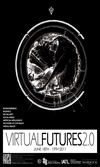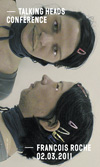Extreme Metaphors
My new book is out.

Available in the UK and Germany via Amazon (and, of course, in all good bookshops etc., etc.)
posted on 21.09.12
New edition of O(rphan)d(rift>) Cyberpositive
A new edition of the O(rphan)d(rift>) book from 1995, Cyberpositive is out on the 19th of July.
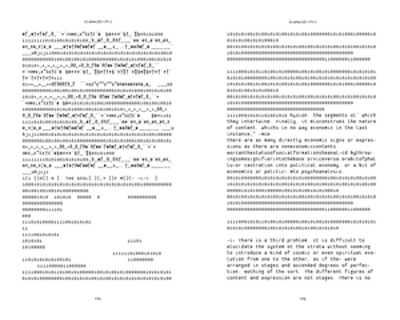
This is a very timely re-issue given the recent vaunting of the 'New Aesthetic', which may be interesting insofar as it expresses some digital artists' felt need for *something* new at the present, but gives the rest of us a sense of weary déjà vu. As McKenzie Wark notes in interview with David Cox, the 'New' Aesthetic has been around since the late 80s and early 90s; most of its central themes and tendencies were documented and theorized by, among others, Scott Bukatman in his 1993 book Terminal Identity.
Indeed, it's astonishing how backwards-looking the New Aesthetic is: the high Modernist 'machine vision' trope derived from Dziga Vertov's 'kino-eye' (1923) and T. E. Hulme's rethinking of Worringer's 'tactile vision' (1924); the obsession with the virtual repeating Wyndham Lewis' invitation to enter the "transposed abstract universe" of The Cubist Room (1914); the tendency to reveal structure, a commonplace of postmodern fiction since the 1960s; the use of algorithms and bricolage, a faint echo of John Cage's aleatoric compositions such as Child of Tree (1975); the discovery of 'glitch' a simple duplication of, well, glitch, in everything from the visual glitches in The Max Headroom Show (1985) to the glitch techno movement after Basic Channel (1993)...
Of course, to catalogue the antecedents of a current movement is not to deprive it of its newness in combining those influences. But these particular influences have already combined to produce exactly the same aesthetic once before in the 1990s, from when The Silicon Man was first published (1991) to when Mute magazine's pilot issue appeared (1994), Virtual Futures took place (1994-6) and O(rphan)d(rift>) published Cyberpositive (1995).
If the popularity of the New Aesthetic does anything positive, it's to get people talking about aesthetics generally for the first time since the 1920s; though it's depressing to contemplate the advent of a generation of New Aesthetes. But it also suggests that the mainstream has finally acclimatized to the aesthetic of the mid-1990s. To read Cyberpositive again is like meeting the scarred and tattooed badass older brother of NA, fresh out of prison and hungry to go whoring and scoring. It's exactly the jab in the arm the NA movement needs.
The book launch is (once again, as it was in 1995) at the Cabinet Gallery in London, from 6pm to 9pm on the 19th July.
posted on 13.07.12
LiSC
Had an extraordinary day at the Lincoln Social Computing Research Centre at the University of Lincoln on the 6th June, having been invited to talk about "Emergence and the Synthetic Aesthetic" by Shaun Lawson. Lincoln's a place to watch: as far as humanities computing goes at the moment, these guys are streets ahead, for the simple reason that they're actually thinking reflectively about what they're doing. Sadly, about two questions into the q&a session, the university had to be evacuated owing to a bomb hoax. Cue reflective thinking in the pub.
Find out more about the work LiSC is doing here.
posted on 12.07.12
Recent talks: NEXT Berlin, TED, Science Museum
I've given a few talks on skeuomorphism recently which aren't yet available on video, as far as I'm aware: one on "Emergent Design: How the Skeuomorph helps us to think about Non-Human Agency", at NEXT Berlin 2012 on the 8th May; and another at TEDx Manchester on "Skeuomorphs, evolution, and technology", on the 13th February. The video of the talk I gave back in December at the Science Museum is up, though. The hirsuteness is the result of trailing around South America for several months; I didn't actually get a haircut or a shave until I got to Paraguay two months later. I think it used to be known as 'going native':
Robot Futures: beyond the valley.
posted on 10.07.12
Science Museum, London
I'll be coming over to London to speak at Robot Futures: beyond the valley on the 1st of December. It's a Lirec event at the Science Museum, with the associate editor of Wired, Olivia Solon; the artist Ghislaine Boddington from body>data>space; Matt Jones from BERG; and Peter McOwan from Queen Mary Westfield University.
I'll very likely be speaking elsewhere whilst in Europe; follow me on Twitter - @skeuomorphology - for updates.
posted on 10.11.11
Interviews & talks: video and audio
This year's Virtual Futures 2.0'11 conference was astonishingly productive, and the results of the new ideas discussed and new collaborations formed are still reverberating around the net, the media and the conference circuit. Hopefully I'll be able to speak about some of those results in the near future; in the meantime, much of the conference is now available on video.
My opening lecture at VF is below:
Virtual Futures 2011 - Dr. Dan O'Hara from Virtual Futures on Vimeo
Shortly before the conference, Amy McLeod from the Warwick Knowledge Centre interviewed me, mainly about skeuomorphs (the topic of the book I'm writing at present): the podcast of that interview is available here.
There was a lot more talk of skeuomorphs in my live chat, 'Understanding the Virtual', following the conference; you can read a somewhat truncated and edited-down transcript here. The actual event was invaded and eventually DoSed by 4chan, the guys who hacked Sarah Palin's emails... it was quite an honour to get 4channed, but the real transcript is unprintable.
Rhizome.org picked up on the skeuomorph meme and published another version: Dan O'Hara on Skeuomorphs, JG Ballard, Transhumanism, and the "eradication of individual identity.
And archive video from the 1995 Virtual Futures conference is steadily being digitized and placed on the VF Youtube channel: below is an interview conducted with me recently, which includes a large chunk of the archive footage of Stelarc's legendary 1995 performance, in which I'm bobbing around in the background with an orange mohican, trying to fix the sound levels, whilst Stelarc waves his third arm about menacingly...
The History of Virtual Futures - Dr. Dan O'Hara from Virtual Futures.
posted on 13.9.11
Deleuze Colóquio in Rio de Janeiro
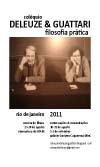
On the 31st of August, I'll be speaking at Colóquio Deleuze & Guattari: Filosofia Prática about Deleuze, diagrams, and art brut. The event's held at the Palácio Gustavo Capanema in Rio de Janeiro, and runs from the 30th of August to the 2nd of September; it's preceded by three days of film screenings, music, dance, and performances, from the 25th to the 28th of August. The full programme is available via the link above.
I'll no doubt also be talking about the Deleuze & Guattari Concordance, which is grinding slowly forwards, and it'll be hard to avoid talking about skeuomorphology, as I'm currently living in Rio in order to write a book about skeuomorphism and the rôle it plays in the evolution of style.
posted on 20.8.11
Virtual Futures 2.0'11 programme
The speakers list and programme for Virtual Futures 2.0'11, to be held at Warwick University on the 18th and 19th of June, have been released. I'll be there giving the opening plenary, talking about "Non-Human Agencies: A Skeuomorphological Account".
It's a great line-up: Stelarc returns, as do Rachel Armstrong, Ian Stewart, Jim Flint, Mark Fisher, Diane Gromala, Sue Thomas, Pat Cadigan, Richard Barbrook, Nick Fox, Martyn Amos, and o(rphan)d(rift>); plus Kevin Warwick, Sue Golding, Andy Miah, Alan Chalmers, Steve Fuller, Jeremy Wyatt... No Hakim Bey this time, though. Registration is now live.
posted on 20.05.11
Virtual Futures returns
Fifteen years ago, I wrote in the TLS that the rate of social change was itself accelerating. This year, I find myself the victim of my own prophecy.
At Warwick University on the 18-19 June, an event resurrecting Virtual Futures, Virtual Futures 2.0’11, takes place, organized by Luke Robert Mason, who's doing his research thesis on the influence the conference had upon philosophy, technology, and culture, and investigating the ways in which VF led to modern synthetic biology, living architecture, and transhumanism.
It's both extremely flattering and mindsplittingly frightening for a jobbing academic to find his activities of a mere fifteen years ago the subject of new research and conferences. I seem to be becoming-historical, as Deleuze might have said.
Anyone who was at the original conferences is especially asked to get in touch with the organizer, Luke; the line-up of speakers already looks like TED to the power of n...
posted on 02.04.11
HEAD Genève update
The Talking Heads event at l'Haute école d'art et de design, Genève (Geneva University of Art and Design) takes place this Wednesday at 7pm. I'll be in Deleuze-inflected conversation with Francois Roche. Click on the image above for the poster.
posted on 28.02.11
HEAD Genève
On the 2nd of March I'll be at l'Haute école d'art et de design, Genève (Geneva University of Art and Design), as François Roche's special guest. He'll be speaking about "Speculations, Fictions, Here & Now / Skyzoid machines & Ecosophical apparatuses", and I'll also speak separately, and/or we'll engage in dialogue: more details soon. It's part of a public lecture series, and all are welcome.
posted on 10.01.11
USC, USA
In September, on the 29 and 30th, I'll be speaking (with Toni Negri, Rupert Soar, Jean Didier Vincent, Francois Jouve, John Holland, and Greg Lynn) at the University of South California on the topic of mind and machine. There's no programme yet, but I'll place a copy here when it becomes available
The event is interdisciplinary, and involves neurobiologists, mathematicians, architects, and philosophers. It's organized by
François Roche, whose work as an architect using Deleuze is absolutely compelling.
posted on 11.12.10
Samuel Beckett Today/Aujourd'hui
The new volume of Samuel Beckett Today/Aujourd'hui is now out, available on Amazon; it contains my essay 'The Metronome of Consciousness'.
posted on 20.11.10
Skeuomorphology
The programme is now available for the Morphomata symposium, 'Creativity of Finding: Figurations of the Quotation'. It runs from the 3 - 5 November 2010 at the University of Cologne. I'll be speaking on Friday the 5th about "Skeuomorphology and the Evolution of Literary Quotation".
posted on 26.10.10
Forthcoming talks, part 2
I'll be speaking at Who's afraid of...? Facets of Fear in Anglophone Literature and Media at Rheinische Friedrich-Wilhelms-Universität, Bonn, which runs on the 24-5 September. The talk is provisionally titled "A Formula of Fear: Hollywood’s Return to Romanticism".
On the 4-6th November, I'll be talking about "Skeuomorphology and the Evolution of Literary Quotation", here at the Universität zu Köln, at the Morphomata Kolleg event provisionally called 'Creativity of Finding: Figurations of the Quotation' [no programme yet].
posted on 30.6.10
O. Henry
On the 5th of June it's the 100th anniversary of O. Henry's death. I'll be on Zeitzeichen on WDR, talking about his life and literary works.
posted on 8.5.10
Forthcoming talks, part 1
A proleptic roundup of some conference talks & guest lectures:
On the 24th of April I'm speaking at Modernism and Utopia: Convergences in the Arts about "The Machinery Underground: Subterranean Space and Modernist Utopias". This is a 2-day conference on the 23rd and 24th at the University of Birmingham, UK.
On the 11th of June I'm talking with Alex Burghart at l'Université Paris IV-Sorbonne on "Ruins of statues and the dystopian landscape". This presentation is part of a book we've been writing on the apocalyptic imaginary in English and American history; the event is a symposium organized by Prof. Jacques Carré on «Utopie, ville et paysage dans le monde anglophone». It runs on the 11th and the 12th.
On the 17th & 18th of September at Johannes Gutenberg University, Mainz, Germany, I'll give a paper at the conference Contemporary British Fiction: Narrating Violence, Trauma and Loss, on "Traumatic Irony: A Model of Unintentional Disclosure".
posted on 3.4.10; updated on 2.6.10
Deleuze&Guattari Concordance: A Thousand Plateaus
A more permanent home for the DeleuzeGuattari Concordance: follow the menu at the top of this page.
posted on 24.8.09
Deleuze&Guattari Concordance: A Thousand Plateaus
For the duration of the Deleuze conference at Cologne, I've placed a concordance to A Thousand Plateaus on this site.
This is part of a project to produce a complete concordance to Deleuze & Guattari, incorporating all of their works published in English. There are occasional errors in the ATP concordance here - it's a work-in-progress - but it gives a good idea of what concordances can do, and what the final version could look like.
posted on 10.8.09
Round Table on Elitism

On the 9th of June there'll be a round table discussion about the concept of elitism in education in Germany. With Prof. Dr. Tassilo Küpper, the Rektor of Cologne Uni from 2001 to 2005, Prof. Dr. Sylvia Heuchemer, the Vice-Rektor of Cologne Fachhochschule, Dr. Kerstin Dell of the Cusanuswerk (a foundation which provides doctoral funding and support for Catholics in Germany), and
Julia Mölders, student at the private Fresenius University of Applied Sciences, I'll be debating the advantages and disadvantages of meritocratic educational systems. More details here.
posted on 30.5.09
J. G. Ballard, 1930 - 2009
Obituaries and tributes at Ballardian.
posted on 21.4.09
Le monde ballardien
Another translation-article from Magazine Littéraire on Ballardian. This one was first published in 1985, after the publication of the French edition of Empire of the Sun. Lots of interesting details here, especially in Ballard's comments on the role mediatized perception plays in the novel, often regarded as his most im-mediate, Realist work: ‘Le passé composé de J. G. Ballard’: JGB on Empire of the Sun.
posted on 11.3.09
New series of French Ballard interviews
A new series of articles starts today on Ballardian; I've been back-translating the various French interviews to have appeared over the past 40 or so years. The first up is a brief but intriguing interview from Magazine Littéraire in 1975, when Ballard was writing High Rise: ‘Content in their little prisons’: J.G. Ballard on ‘The Towers’.
posted on 21.11.08
Violence without end
One further back-translation of an interview with J. G. Ballard at Ballardian, this one from the German broadsheet Die Zeit in 2005: 'Violence without end.'. Here, Ballard reiterates his concern that meaningless violence may become a consquence of modern middle-class ennui, and discusses the aftermath of hurricane Katrina in New Orleans.
posted on 24.6.08
'Why I Want To Fuck George W. Bush'
...or not quite the last of the German J. G. Ballard interviews. Published today on Ballardian, another of my re-translations, this one of an interview from 2007. Ballard's in a wonderfully mischievous mood, and the title of the interview, derived from a joke at the end, echoes his story 'Why I Want To Fuck Ronald Reagan': "I really would not want to fuck George W. Bush!".
posted on 17.5.08
Third interview with J. G. Ballard
At Ballardian, the third and last of my re-translations of interviews with Ballard. 'Der Visionär des Phantastischen' comes from a German collection of essays on Ballard published in 1985, which makes that collection the first (and still the only) scholarly collection on Ballard's work. It's curious how quickly the Germans fastened onto
Ballard's importance: the Munich Round Up interview, a transcript of a TV interview, was very possibly only Ballard's second interview ever given.
This interview seems either to be exceptionally well-edited or to be the result of a fortunate patience on the part of the interviewers, who are happy to let Ballard talk without interruption. Though the themes are well-worn - pornography, punk, LSD - the conversation still detours into more intriguing
areas, particularly where Ballard disavows any influence of William Burroughs, and describes the difference between their approaches to ontology and the novel.
posted on 4.5.08
Second interview with J. G. Ballard
The second of my re-translations of interviews with J. G. Ballard is now up on Ballardian. Entitled "It would be a mistake to write about the future", this one was originally conducted in 1976 in Shepperton.
It's packed with unusual comments: Ballard describes the way he incorporates cinematic techniques into his fiction in more detail than
elsewhere, and it's fascinating to see how his conception of the way the close-up works anticipates Deleuze's ideas in his Cinema I & II of 1983 and 1985.
The most intriguing aspect of this interview, though, is the stress which Ballard places upon the moral imperative to take not only one's subjects from the present, but also one's methods. Elsewhere he's dismissed any suggestion that he's a moralist, but this comment might explain why critics have mistaken him for such.
posted on 23.3.08
Interview with J. G. Ballard
Up today on Ballardian, a transcript of a 1968 interview with J. G. Ballard. This is the first of three interviews, all originally published in German, which I've re-translated into English. None of them has been available in English before, and whilst they certainly contain plenty of familiar material,
there's also a decent amount of material not covered elsewhere, from biographical details to observations about film, Russian literature, and his own narrative technique.
This first interview is a peculiar one: seemingly assembled from the sub-titles of a long-lost interview which Ballard gave to Bavarian TV in 1968, the questions are missing. Reading it now, one has to guess what questions Ballard
might be answering. But then this method is exactly the one Ballard employs in his 1985 short story, 'Answers to a Questionnaire', in which one is given the answers, but not the questions...
posted on 15.3.08
Ballard in Berlin
Newly out on Ballardian, an interview I did last year with Paul Plamper and Niklas Goldbach, who have adapted J. G. Ballard's High Rise into a German radio play and film. Called Hochhaus, the adaptation is, for my money, the best adaptation of Ballard yet; more entertaining than Spielberg, more sensitive to Ballard’s subtleties than Cronenberg. Ballard's 1975 novel is transplanted to Berlin in 2013, giving it an entirely different and very suggestive historical context. Especially perceptive about the politics of architecture, Plamper and Goldbach have their own unique take on Ballard's modern relevance.
posted on 10.1.08
Beckett's Ping
There's a new squib out in Notes & Queries about Samuel Beckett's short prose work Ping, proposing a new reading based on his use of some technical terms. This may be rather late news: apparently it's been available on advance access since August 15, but I hadn't noticed.
posted on 11.10.07
Reports from the Ballard conference
The Ballard conference at UEA was quite a plateau of sustained intensity. At the always-excellent Ballardian there's a very comprehensive overview of the weekend, with links and trackbacks to other blogs with write-ups. And quite extraordinarily, Ballardian scholarship has its very own recording angel, Rick McGrath, at whose site there's now an archive of many of the papers in audio, with photos and abstracts.
posted on 24.5.07
UEA Ballard conference
There's much more information now available on the conference on J. G. Ballard, on the 5th and 6th of May at UEA. As well as the full programme of events, there are also abstracts now online.
posted on 29.4.07
Further details on UCD
Next week the events at UCD take place. On Wednesday the 4th of April I'll be giving a lecture on "Deleuze and the Machine in
Schizophrenic Art"; this will take place in the School of English at 4pm. On the following day, I'll be running a workshop on key concepts in Deleuze and
Guattari, from 10am 'til 5pm. This session is aimed at non-philosophers who are using, or who are considering using Deleuze in their own work. Which of Deleuze's concepts
are best suited to the varied tasks and sub-fields of criticism?
During the workshop we'll be working initially on basic concepts, and then on some
examples of their application in literary criticism, film studies, queer theory, and archival work. By focusing on the methodological problems
specific to these disciplines, we should be able to identify which of Deleuze's concepts are most appropriate to each discipline; we should also be able to
discard those concepts which are less suited to the work of criticism.
posted on 29.3.07
Köln
As of Wednesday the 14th I'll be based at the University of Cologne, teaching mainly American Literature. More details, including work contact address and numbers, can be found at my section of the Köln website.
posted on 12.3.07
Conference on J. G. Ballard
On the 5th and 6th of May there's the first ever conference on Ballard's work, held at the University of East Anglia. Called "From Shanghai to Shepperton": An International Conference on J.G. Ballard, it's a pretty wide-ranging event, with over 40 speakers involved. There's even a session on Ballard and Deleuze, which sadly I'll miss, as at the same time I'm speaking in another session, on "Reading Posture and Gesture in Ballard's Novels". This is clearly some kind of divine punishment for writing something which isn't about Deleuze... The final programme is now available at the conference website (follow the above link).
posted on 12.3.07
Guest lecture & workshop on Deleuze at UCD
I'll be at University College, Dublin on the 4th and 5th of April; on the Wednesday to give a lecture about Deleuze's relation to schizophrenic art, and on the Thursday to run a workshop on key concepts in Deleuze and Guattari. More details soon.
posted on 9.3.07
Another Deleuze lecture at Cologne
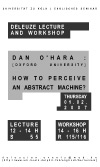
On the 1st of February I'll be once again at the University of Cologne. The lecture will deal with the difficulty in diffentiating between
abstract machines as components of the virtual, and machinic assemblages as components of the actual. How can we perceive abstract machines, if they exist only
as virtual diagrams?
By looking at some examples of machinic assemblages in art, literature, and psychiatry, I'll present a technique whereby we can analyse the
relation of these assemblages to their abstract machines. The job of measuring the degree to which any assemblage is actualized or virtualized is what Deleuze calls
schizoanalysis. I'll be suggesting a way in which we can schizoanalyse all artefacts, whether they be artistic, literary, or technological.
posted on 22.1.07
DeleuzeGuattariWiki
New in the resources section: a concordance of Deleuze & Guattari's terminology, organized as a wiki. This isn't a wiki in
the strict sense, as it's not server-side and so it cannot by edited by viewers; its main purpose is to act as a quick reference tool for definitions.
It's a resource I developed for use primarily in workshops on Deleuze, and so it contains links to external wikis which are server-side, and which
act as user-editable community resources for making working definitions of Deleuze's concepts.
This is very much an experiment and work-in-progress;
at present it's limited to just a few terms, but over the next year it should grow (or indeed contract) into a definitive concordance.
posted on 22.1.07
Article on Thomas Pynchon in the Sunday Times
The lead article in today's Sunday Times Culture section is an overview of Pynchon's novels and reluctant celebrity. Bryan Appleyard, the author of an eloquent and sober study of belief in the existence of aliens - Aliens: Why They Are Here - examines Pynchon's life, writings, and literary reputation, discussing with me (among others) the likely longevity of Pynchon's appeal. The article can be found here.
posted on 3.12.06
Deleuze cluster at Cologne
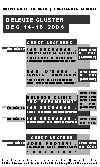
From the 14th to the 18th of December there's a series of lectures and seminars at the University of Cologne, all dealing with Deleuze. On the 14th I'll
be giving a lecture about the various types of abstract machine to be found in fiction and non-fiction. The other lectures are by Ian Buchanan, who'll be
talking about Deleuze and Cinema, and also running a lecture series and workshop on Anti-Oedipus, and John Protevi, who'll be talking about
Katrina (the hurricane). More details on the poster above.
posted on 17.11.06
